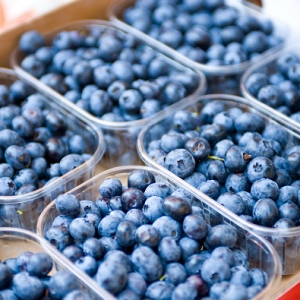Workers head out each morning to pick the plump, ripe blueberries from bushes that run in long rows, like ribbons, across thousands of acres around Hammonton.
All the care and labor - the pruning, fertilizing, and watering - comes down to this peak harvest time, usually from mid-June through the end of July.
And so far, it looks like it's paid off.
Barring hail damage or persistent heavy rains, blueberry production looks promising this season, farmers said.
Last winter's frigid temperatures were severe, May was dry, and June was wet. "But we're an industry that knows how to deal with the weather," said Denny Doyle, general manager of the Atlantic Blueberry Co.'s 1,000-acre farm here, and vice chairman of the New Jersey Blueberry Advisory Council, a nonprofit advocacy group for the growers. "Just don't mention that word hail.
"We're doing very well," said Doyle, a fourth-generation blueberry grower who also owns a 20-acre farm in New Lisbon. "We're right in the middle of the harvest and we'll be into it until August. This is a very busy time."
Last year, New Jersey ranked fifth nationally in the value of its blueberry production, bringing in $79.5 million - a 40 percent increase over the previous year, when it took in $56.8 million. In 2013, bad weather - freezing and rain damage - resulted in a poor harvest.
"Blueberries are New Jersey's state fruit, which readily identifies them as one of our state's most important crops," said Ryck Suydam, president of the New Jersey Farm Bureau, a nonprofit representing thousands of farmers and others in the agriculture industry. "This year's value could well surpass [2014's], as preseason weather spurred the crop's growth."
A couple hundred growers farming 8,800 acres harvested 56.7 million pounds of berries in 2014. A similar amount is expected this year. "We're off to a good start," added Ben Casella, a research associate for the Farm Bureau.
In Pennsylvania, most farmers don't focus on blueberries exclusively. They may be one of several crops that they grow.
"It's part of the business plan, but not the focus," said Mark O'Neill, a spokesman for the Pennsylvania Farm Bureau, representing thousands of farmers in that state. "We're not a big producer of blueberries that are sold and processed.
"You will find them," he said, "but usually along with apples, pumpkins, and strawberries."
In New Jersey, Highbush blueberries - especially the Duke and Bluecrop varieties - are common. Highbush blueberries were first cultivated for commercial production in New Jersey.
Workers "pick them by hand to select the largest, ripest berries, the nicest ones," said Bob Von Rohr, director of marketing at Sunny Valley International, a produce sales and marketing company representing a co-op of nine growers in Hammonton and one in Shamong. "Then, they will go back and do it again, and maybe a third time."
They are soon transported to a nearby packing facility, placed in a refrigerated unit "to get all the heat out of the berries, and bring them down to 34 to 36 degrees," said Von Rohr, whose growers produce 20 percent of the state's crop.
The blueberries are then sorted by color, size, and firmness on a computerized 30-foot conveyor line that removes "those that don't meet the grade," he said. The rest are visually inspected by workers along the conveyor.
The fruit is packed in pint containers, stored in a cooler, and taken by truck that evening or the next morning to supermarkets in the United States and Canada, Von Rohr said.
Though having a bountiful harvest is welcome news, it can also depress prices, farmers said.
At Stoney Creek Blueberries L.L.C. in Hammonton, "the crop is nice," said grower Joe Berenato. "But there is a lot of competition from [blueberry farmers in] Michigan, Oregon, and British Columbia," where the harvest was early.
"We pick by hand and by machine," he said. "It depends on the market."
More of the harvest will be by hand - the more expensive way - "if the price is there in the market," said Berenato, who took over his farm from his father-in-law seven years ago. The blueberries "will be picked by machine and frozen if the price is not there."
The machine-harvested berries are often used for jams, juices, and other products, while the handpicked berries are sold as fresh from pint containers.
Some farms - even a former farm - have invited members of the public to pick their own blueberries.
The Franklin Parker Preserve in Woodland Township, Burlington County, cultivated blueberry fields in its days as a farm - before becoming a nature preserve.
On Sunday, the public is invited to the nonprofit New Jersey Conservation Foundation's all-you-can-pick blueberry event at the 10,000-acre Pine Barrens property.
This summer should be fine for blueberry-lovers and farmers alike, growers and state agriculture officials said.
"So far, it looks good, pending how the rest of the season shakes out," added Casella of the New Jersey Farm Bureau.
07/08/2015
www.philly.com

